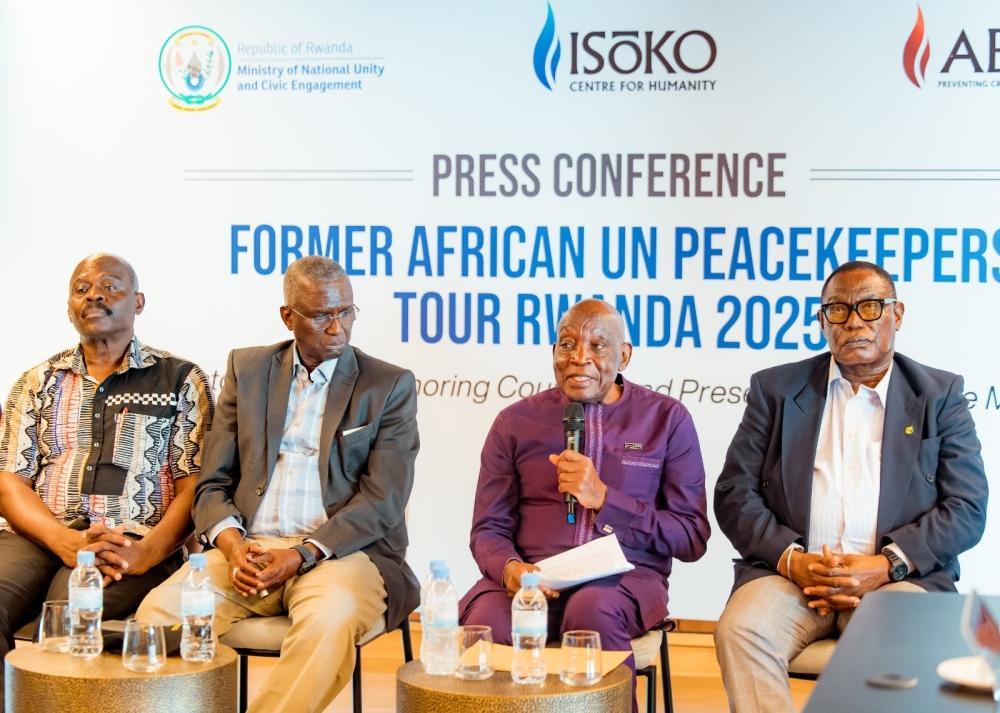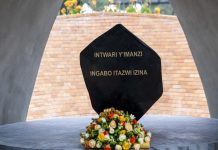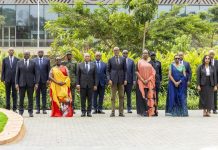Africa-Press – Rwanda. During the 1994 Genocide against the Tutsi, while many soldiers followed orders that failed civilians, a group of African UN peacekeepers made the choice to stay and protect lives.
Speaking at a press conference on Wednesday, August 20, at Zaria Court, after concluding a commemorative and educational tour in Rwanda that began on August 14, the veterans from Ghana and Senegal reflected on what drove them to defy orders and remain.
Major (Rtd) Peter Sosi from Ghana explained that his decision to remain in Rwanda was guided by moral obligation, military training, and personal values.
Former UN peacekeepers in Rwanda addresses journalists during a news conference at Zaria Court in Kigali on Wednesday, August 20. Courtesy
“I had a moral obligation to stay,” Maj (Rtd) Peter Sosi from Ghana told the media. “From my training and upbringing, there was no way I was going to leave, especially seeing the atrocities and the fear around me.
“We were trained to go wherever we are sent and perform our duties, even at the peril of our lives. Empathy and the sense of duty instilled in me by my parents also motivated me to help where it was needed.”
For Maj Gen (Rtd) Clayton Boanubah Yaache from Ghana, the decision to stay had both personal and national significance.
“We were sent to assist Rwanda in achieving peace,” Yaache said.
“At a critical moment, the UN decided all troops should leave. We felt that would be immoral and amount to betrayal. The elements in Kigali made a strong case to our governments that we could not abandon the people. If we had left, none of us would have had the moral courage to return to Rwanda later.”
Yaache explained that negotiations with the UN and their respective governments allowed a small number of troops to remain.
“It wasn’t only Ghanaians. Senegalese troops also stayed and played a crucial role. Our choice was guided by credibility, morality, and support for fellow Africans in their hour of greatest need,” he added.
Brig Gen (Rtd) Martin Owusu-Ababio from Ghana described the practical and logistical decisions behind staying.
“At one point, we had 800 troops deployed. With the situation deteriorating, the UN decided most of us should leave.”
He added, “Two-thirds had to go. This was not about personal preference, it was about selecting those ready, competent, and courageous enough to remain.
Owusu-Ababio explained that remaining on the ground meant confronting the crisis head-on and safeguarding civilians, despite pressure.
Brig Gen Elhadji Babacar Faye from Senegal said that choosing to remain meant taking individual responsibility to assess situations, act decisively, and protect lives.
For Ex WO I Sampson Agyare from Ghana, his decision to stay during the 1994 Genocide against the Tutsi was inspired by his commander, Maj Gen (Rtd) Henry Anyidoho.
“He used to say, ‘I will not accept failure. I will not associate myself with failure.’ Even under gunfire, he encouraged us, saying, ‘They’re not firing at you, let’s go.’ When he decided not to leave the mission, there was no way I could walk away. I begged him, saying, ‘Sir, I want to go,’ but I couldn’t. My decision to stay was not solely my own, it was guided by God and inspired by the leadership of General Anyidoho.”
For More News And Analysis About Rwanda Follow Africa-Press






